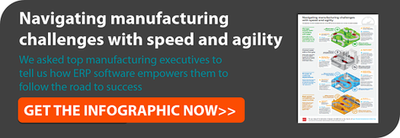There is one similar attribute that all best-in-class manufacturers agree: their supply chain, distribution and service standpoint are very easy to work with the help from cloud-based manufacturing applications, especially Enterprise Resource Planning (ERP).
To maintain position in the industry, manufacturers need to do everything to increase accuracy, speed up their competitive advantage through improved processes, and focus on internal intelligence and knowledge to ultilise every resource. Especially when there is a new product launch, the speed and number of interactions between suppliers and distributors increase so massively that an allocation situation was averted.
Read more: [Infographic] - A comparison of Tier 1 ERP Vendors
Cloud-based ERP solution is the key to help manufacturers bring their innate intelligence and knowledge to sales process. The roll-out time is shortened, customising process is simplified and henceforth, increases adoption rates across wholesalers and retailers. Industries such as high-tech, industrial, aerospace and defense, that have extremely high pressure on product life-cycle and time management, are all using ERP to improve their process.

How does ERP revolutionise manufacturing process?
Problem: Inaccurate demand forecasts
Recent survey “Optimisation trends in ERP usage" by market research firm GatePoint (2013) has shown that 49% of respondents, who are top manufacturing executives, see a need for improvement in forecasting system demand. It is one essential component in the manufacturing process since it will set a general goal for the whole process. Therefore, misinterpreting forecasting system demand will lead to increasing costs, lead time, employee work pressures as well as decreasing profit margin.
Solution: ERP helps keep tight control of supply chain complexity with supply chain management modules and tools that deliver accurate demand forecasts and plans in real-time to enhance manufacturing performance.
Read more: Healthcare ERP boosted by cloud-based supply chain management
Problem: Overgrown costs
73% interviewed executives indicate that cutting costs is their top priority to grow, and 83% industry leaders focus on increasing revenue in the next 18 months according to the survey. As the need of higher revenues increases, the need for higher sales will also arise and consequently facilitate the need to increase production capacity which, in turn, brings about increase in cost. What goes around, comes around.
Solution: ERP helps manufacturers to react quickly to changes in the industry, such as raw material costs and delivery time span. All data will be stored in a single, comprehensive database that allows fast information processing, enables quick and high-quality decisions.
Problem: Inflexibility to customer expectations
In order to outpace competitors, many manufacturers strive to gain differentiation by product innovation. They are pressed to develop products that are inexpensively tailored to changes in customer expectations. This is vital, but along with it is very high costs that sometimes executives cannot balance between product costs and innovation (Accenture, 2011).
Solution: ERP helps manufacturer to be highly responsive and collaborative to customer’s needs and fulfill orders in a short time. Functions and tools such as social tools help promote collaboration across the supply chain, as well as with the customers, configuration management function enables manufacturers to track, quote and sells complex products easily and many more to solve the problem.
Read more: APS - a key integration for modern manufacturing ERP
Problem: Increased global competitiveness
According to KPMG (2013), companies are aiming to new opportunities to expand to new markets. To acquire this, manufacturers has to place the supply chain at the center of their efforts to achieve their strategic priorities, and ultimately, out-maneuver competitions as they seize new growth opportunities. As a result, the supply chain management process is put under the hardest pressure than ever.
Solution: Lean manufacturing is the key to ultilise the supply chain productivity. ERP helps increase visibility in supply chain optimisation as well as improve speed, communication and resilience in the supply chain. Thus, it helps foster better and faster communication and collaboration between partners and customers, even.
Video: CIO of Ferrari talks about their ERP implementation
After the economic recessions in 2008, the global business market is softened with new opportunities for companies, especially manufacturers. However, the competitiveness coming along with opportunities also create a hard times for manufacturers to succeed. They have to constantly meet customer’s expectation and leverage brand awareness by product innovation while maintaining the costs on track. ERP is one key to help reduce the pressure, integrated with purpose-built functionalities for each manufacturing process to speed decisions, pursue new customers, and gain new opportunity with confidence.
Read the infographic “Navigating challenges with speed and agility” to find out how ERP software empowers manufacturers to:
- Manage supply chain complexity with ease
- Control cost with a firm grip
- Surpass all customer expectations
- Beat global competitors to opportunities
This is the first post in our blog series: “Five key factors in optimising complex manufacturing businesses”. Stay tuned for the next blog posts to explore more of what is expected to optimise manufacturing performance while keeping good control on costs, inventory and customer relationship.
The article is written based on analyses and survey results from Infor, Accenture, KPMG and Forbes Magazines.
Accenture, 2011, “Balancing Product Costs and Innovation”, Industry Week, Penton Media Inc.
KPMG, 2013, “Global Manufacturing Outlook 2013: Competitive Advantage”, KPMG Group.
 English
English  Vietnamese
Vietnamese 


